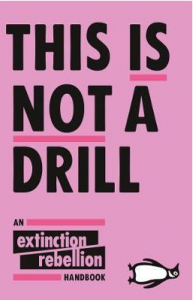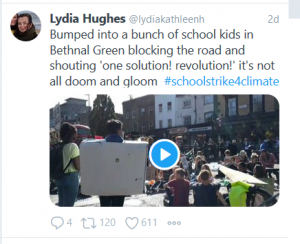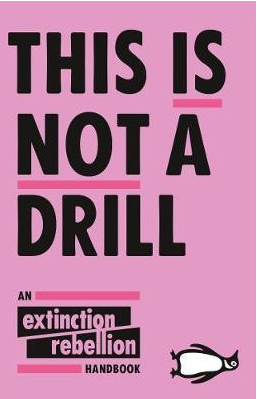Book review and discussion of Extinction Rebellion: This is Not a Drill: An Extinction Rebellion Handbook, ed. by Clare Farrell et al. (London: Penguin, 2019).
Question: Who was described as a ‘true feminist green revolutionary’ in October 2019? (answer at the end; no scrolling now…)

‘Run comrade, the old world is behind you!’ went one of the slogans in Paris 1968. This is still true, comrade, and, catastrophically, the old world of predatory capitalism is rearing up in front of us too. Extinction Rebellion (XR) has been at the forefront of the recent upsurge of ecological mobilisations, challenging the consequences of the current trajectory of infinite economic growth for climate change and the living world. This is Not a Drill is the first book-length expression of XR’s ideas. XR presents itself as something of a brand, which immediately raises questions of trust. As a critical friend, I will say at the outset that my thoughts on XR are fluid and I will re-read this review with interest in a year’s time. My current thinking suggests that, given other options – neo-liberal business as usual or ultra-green and left detractors lacking viable alternatives – the best approach is to forge a progressive and effective movement for ecological justice with the numbers and impact of XR, the optimism and dynamism of Youth Strike 4 Climate and the more revolutionary and far-reaching ideas of the IWW’s Earth Strike and Green Anti-Capitalist Front. This review of This is Not a Drill will consider some of XR’s strengths, weaknesses opportunities and threats.
Strengths
At the time of writing, XR is a year old. During this time its impact has been impressive, pushing concerns about climate change and the breaching of planetary boundaries onto the political agenda. Three major mobilisations in London have driven this achievement, alongside hundreds of local protests and direct actions confronting issues such as airport expansion and fracking. XR has also inspired action beyond the UK, with many international actions taking place under the XR banner in October 2019. XR has built upon, and learned from, previous social movements such as Reclaim The Streets and Occupy. Like similar predecessors, XR creates empowering and exhilarating opportunities for participation, producing experiences, which can be personally transformative. Moments of learning, togetherness and serendipity should be cherished in their own right since, as beautifully observed in the 2019 Past Tense pamphlet Road Rave: A Very Brief History of Reclaim The Streets, Extinction Rebellion and Beyond: ‘Both RTS and XR actions at their best, like all moments of struggle, produce consequences primarily in the people involved in them, whether or not the “campaign” itself wins what it fights for’ (24). Also, echoing Occupy, Vandana Shiva attacks the ‘Limitless greed of the 1 per cent’ in the forward to This is Not a Drill (5). XR has, for the most part, been able to frame the problem as one that entrenched in economic injustice and therefore as systemic. It is important, therefore, to acknowledge some of the successes of XR’s first year.
To date, XR has demonstrated two chief strengths. First, XR has shown the ability to build up a robust support infrastructure. Second, underpinning its objectives and awareness-raising with community-skills sharing and evidence-based information. Tactically it has been effective, with high-impact actions bolstered by what William Skeaping’s essay refers to as ‘stories of epic reinforcement’ (139). Moreover, XR has been audacious in its demand for immediate change. Previously, mainstream environmental campaigns have sought to take a softly, softly approach for fear of alienating potential support. By contrast, XR stresses its watchwords #tellthetruth about the perilous direction that capitalism is taking and has been upfront about the devastating consequences to come if there is no far-reaching systemic transformation by the ambitious deadline of 2025. Public opinion polls appear to indicate a significant shift in citing ecological crises as a priority since the Declaration of Rebellion and the publication of demands to be heard set out in This is Not a Drill. Whether XR will continue to seize the headlines and maintain its high-profile remains to be seen.
Efforts to reach out to a wider constituency of support and to include diverse voices have also been one of XR’s strengths. Essays in This is Not a Drill reflect this, with voices from the global south and awareness of inclusivity and global justice being prominent. Embedded within the XR organisational framework are multiple community XR groups incorporating categories of diaspora, professions and skills, religions and faith and social groups. Groups such as the Environmental Justice Block have worked with the XR network to make wide appeal a priority. These attempts are a step forward, since the failure to build a broad front has been a major cause of the lack of progress during the previous half-century of environmental campaigning. However, this must, of necessity, be a working project.
Success in community outreach, however, has been less decisive. There is a perception that white middle-class activists are still the most prominent in mobilisations and in decision-making processes. Distrust of the police and other state agents long tasked with the enforcement of a so-called ‘hostile environment’ against migrants serves to alienate many at the sharp end of such policies from love chants bestowed upon the police. Debt-ridden working-class communities battered by years of austerity are not in a position to be willingly arrested and face expensive court costs. A nurse involved in the Autumn Rebellion commented to me: ‘people struggling with big debts cannot afford to risk arrest and £700 fines, so don’t feel able to engage in the same way’. Nevertheless, awareness of ecological justice issues is integral to the approach set out in This is Not a Drill. Farhana Yamin, for example, discusses XR’s launch of an International Solidarity Network which is forging links in with ‘existing resistance in the majority world’ (26) where the ecological crisis is already a present-day reality. XR’s attempts at community outreach and incorporating class and colonialism in its approach are, therefore, encouraging, yet reservations remain as to the extent that such issues are being addressed and integrated in practice.

Banksy – photo by Andy Davidson (Creative Commons Attribution-ShareAlike 4.0 License on Wikipedia)
Weaknesses
The lack of solid demands is a fundamental weakness of the XR project. Its three stated aims (now formulated into a Three-Demands Bill) are welcome but vague, and limited to lobbying the government for change. Unfortunately, lobbying the Johnson government, and its neo-liberal counterparts, is like trying to persuade a cat not to eat sardines. The contributors to This is Not a Drill are clear in setting out the need to address the ecological crisis and making the case for positive change. This should not be controversial. XR fails, however, to articulate a pathway for the kind of radical social transformation necessary to achieve such aims. Inevitably, once more specific measures to bring about a net zero-carbon future are identified, conflicts of ideology and interest emerge, and with them issues of social power. As the contributors are aware, the ecological crisis is therefore not, despite one XR slogan ‘beyond politics’ (178), but an expression of a situation in which populations are locked into dysfunctional and unsustainable economic and political systems. Attempts to move beyond this situation cannot simply be asserted. We should always ask of any programmes based on the ecological crisis ‘Who stands to benefit?’ ‘How might it scale up or across?’ ‘How is democratic decision-making and accountability ensured?’ These are political questions.
While XR have often been tactically astute in their approach, the network’s overall strategy is doubtful. The prominent strategy has been to call for nonviolent civil disobedience to disrupt business as usual through city-centre blockades. Excellent base-building, with the development of many community support and affinity groups has generated and sustained such mass actions. These actions have inevitably involved mass arrests of XR activists; in excess of 1800 during the Autumn Rebellion in London (October 2019) alone. To be successful in maintaining momentum, XR’s mobilisations need to snowball in scope and intensity over time. It is questionable, however, whether such actions and numbers of arrests are sustainable; as the novelty, and hence newsworthiness, of such an approach diminishes it is difficult to foresee that numbers will continue to increase.
Furthermore, there have been significant personal costs incurred in terms of the financial burden and risk of ‘burnout’ upon individuals and groups. Moreover, the Green and Black Cross, a group that provides legal support to people undertaking protest and direct action, felt compelled to withdraw its limited resources from XR actions in May 2019. This was due to the overload of cases and misgivings about what they perceived as failings in the movement’s approach to legal support. Green and Black Cross, together with others within XR, have also repeatedly expressed concerns about the way that XR groups have been collecting significant amounts of personal data from XR supporters. While this may be due to the well-meaning principle of transparency, such practices risk compromising supporters’ online and personal security. Ongoing evaluation and adaptation of current strategies is essential and should be integrated within the necessary escalation of ecological resistance over the coming months.
Linked to such strategic and organisational weaknesses has been controversy regarding the targets chosen for XR actions. City-centre disruption is justifiable in the context of an ecological emergency but can backfire if it impacts ordinary people, rather than targeting the organisations of capital and state responsible for systemic ecological destruction. To this end, XR chiefly blockaded government buildings and infrastructure related to climate change during the October 2019 Rebellion. XR targets have included the Treasury, the House of Commons and the London Stock Exchange. Unfortunately, when one of XR’s religious affinity groups undertook an ill-judged and widely reported intervention, which involved occupying underground trains at Canning Town tube station, the action backfired significantly when some commuters violently assaulted the activists involved. While there are far better targets for class anger than climate protesters, countless commentators, including many XR sympathisers, understood this was an own goal, and justifiably criticised the action. The outcome was met with delight on the part of the right-wing press (who finally provided coverage denied to similar actions at Liverpool Street tube station at the heart of the City’s financial district) and other detractors since it deflected attention from the ecological emergency.
Part of the strategic difficulty is that, while This is Not a Drill claims to be XR’s Handbook, two of the group’s most prominent theorists, Roger Hallam and Gail Bradbrook, do not clearly articulate how getting people onto the streets, with accompanying advice on how to block a road or shut a bridge, will unleash the potential to bring about far-reaching ecological transformation. How will government declarations of a climate and ecological emergency translate into policies that confront the current perilous trajectory of environmental destruction, within a capitalist system reliant upon economic growth? Challenges concerning effective strategy have confronted to all ecological activist groups from Greenpeace and Friends of the Earth to Earth First!, Reclaim The Streets and Climate Camp. These groups and others have won notable battles over the past fifty years, but have not scaled up to shift the paradigm of destruction. As the ecological crisis deepens, the current wave of activists cannot afford to fail.
Opportunities
The diversity of perspectives within the current green resurgence presents challenges for cohesive action, but also opportunities to reflect and develop new initiatives. One of XR’s early actions was to occupy Greenpeace’s offices in London, offering love and challenge (126-27). Unlike Greenpeace, from the outset the message in This is Not a Drill is explicitly anti-capitalist, the tone set by Sam Knights’ insistence that systemic change is necessary and essential:
More and more people are joining this movement as they realize that the climate crisis – and the associated crises of capitalism and colonialism that caused it – will not be solved by gradual reform and rotten compromise. This is a crisis that requires radical system change on a scale never seen before (11).
XR’s basic case is a strong one. First, that planetary boundaries are already being breached with disastrous and escalating consequences. Second, that the percentage of the population who are now convinced of this situation can mobilise to infuse a sense of urgency that translates into far-reaching social concern and political action. The mainstream media will find it increasingly difficult to keep environmental issues out of the headlines or to frame their stories in favour of business as usual. It has also been stressed that humanity is confronted by an extensive ecological emergency, not solely a climate emergency. The huge Earth Strike Day on 20th September 2019 proved that a significant number of people believe that this ecological crisis is a political and social priority. In Bristol, for example, thousands joined what was to be one of the largest political demonstrations for many years. They showed that there is already a significant constituency of support for radical change beyond the parameters of XR actions. XR’s focus to date has been to use civil disobedience as a lobbying tool to exert pressure upon government and to appeal to the multinational corporations that are causing the crises.
However, there is also an opportunity for a wider demands-led, solutions-focussed approach, one that doesn’t depend upon, but rather outflanks, government action. There is potential for a more empowering strategy to affect authentic change. The emphasis of Earth Strike UK’s Green Great Charter is in part grounded in the principle that, rather than appealing for green austerity, we should be agitating for, and emphasising, changes that have widespread community benefits. It advocates transitional demands that expand the commons and democratic control of the means of production and distribution to ensure that essential goods and services are prioritised. While XR looks to leverage 3.5% of the population already sympathetic to its cause to pressurise the government through lobbying, inspiring this percentage of the population to implement direct-action for change at the community level may well have greater impact and be more sustainable.
Above all, interventions that are inventive, unco-opted and constructively critical have the best chance to generate solidarity and bring about changes that create fresh opportunities for further changes. The Salish Sea Black Autonomists recently tweeted some wise words that can be applied not just to XR, but to the wider present-day social movement for ecology:
When it comes to any uprising or social movement, it’s never a question of ‘support’ – to spectate on the sidelines and ‘support’ or ‘denounce’ is useless. It’s always a matter of finding friends and figuring out how to intervene as one force among many contradictory forces.
(Salish Sea Black Autonomists, 8 September 2019 on Twitter).

Threats
The programme set out in This is Not a Drill faces significant internal threats from within XR. Chief among these are expressed through misgivings about XR’s links to business and the risk of appropriation by those interests, and also concerns about the organisation’s structures of power and accountability. In addition to the weaknesses already discussed, the XR project risks recruitment to the interests of ‘green’ entrepreneurship, interests that at their most cynical seek to turn ecological disaster to account by boosting profits. ‘Green’ capitalism’s efforts to seize opportunities for increased market share risks refuelling, rather than reversing, the current model of extraction and consumption. Grassroots activists within XR need to be conscious and vigilant since there is a thin line between working with private organisations and working for them. In May 2019 XR was forced to issue an embarrassing retraction when an XR Business website was set up, only to be swiftly removed following resistance from its supporters and other critics. The controversial issue of XR’s approach to business does not feature in This is Not a Drill. Contributor Kate Raworth draws attention to the formidable challenge presented by structural dependency on the capitalist economic growth model, calling for ‘economic rebels to create thriving, regenerative and distributive economies that can meet the needs of all people within the life-supporting systems of the unique living planet’ (154). I would not argue with this aspiration. The means to affect this transition from dominant forms of neo-liberalism and globalisation are a challenge to all progressive social justice and ecological movements.
The issue of governance is also absent from This is Not a Drill. XR’s website provides information about the way that its Self Organising System attempts to address the challenge to implement non-hierarchical organisational structures. XR’s current decision-making processes, however, are contested and apparently fluid. Pre-existing doubts about the organisation’s ‘post-consensus’ model were exacerbated by the debacle at Canning Town tube station (mentioned above) which revealed significant shortcomings, now acknowledged within XR. Trust-building within the wider network is essential if its integrity and coherence are to be retained, while rejecting both vanguardism and the ‘tyranny of structurelessness’. Citing the effectiveness of Bristol’s local Easton Anti-Poll Tax Union, Danny Burns and Cordula Reimann’s essay on ‘Movement Building’ (106-8) advocates the kind of decentralised community base-building and solidarity that was generated to resist and defeat the poll tax during the 1990s. If XR is to follow a direct-democracy model it would do well to follow the governance of the libertarian municipalism espoused by social ecologists in keeping with Murray Bookchin’s ideas. On this model, powers are devolved to the local level which sends recallable delegates to regional assemblies. These can ultimately constrain the actions of entities which break underlying principles of democracy and inclusivity vested in popular assemblies. For XR, efforts to negotiate power within a socially and ideologically diverse network continue to evolve; its ongoing record in this area will be a significant determining factor in the network’s success or failure over the coming months.
Inevitably, the greatest threat to Extinction Rebellion will come from the combined forces of the state, especially during a Conservative administration, and political and economic interests represented through the mainstream media. Despite the May government’s previous declaration of a climate emergency, Boris Johnson quickly labelled people on the streets for the Autumn Rebellion as ‘uncooperative crusties’. Speaking in front of a Policy Exchange backdrop (see below), this signalled that the neo-liberal ideologue would take a confrontational stance. Home Secretary Priti Patel also immediately affirmed a draconian approach. First, in an attempt to pre-emptively thwart the mobilisation, the Police Territorial Support Group arrested activists for ‘conspiracy to commit public nuisance’ and confiscated camping equipment during the run-up to the Autumn Rebellion. Efforts to neutralise the impact of XR and other ecological direct-action groups were applied by arresting increasing numbers of people for civil disobedience. A Frome activist spoke to me of soft measures to demoralise; police timed their move in on mass make arrests, for example, for the moment when a huge communal dinner was served. The police adopted repressive measures, moreover, by criminalising the entire protest under the Public Order Act, when, on 14th October, they announced a ban on any further demonstrations in London over the following days. Subsequently, on 6th November, this ban was judged to be unlawful in a ruling at the High Court.
Alongside, overt ‘overground’ policing, events over recent decades have shown that police spies not only routinely infiltrate direct-action ecological groups, but will go to extreme lengths to undermine campaigners. The publication of the Policy Exchange’s report Extremism Rebellion: A Review of Ideology and Tactics, in July 2019, indicated that XR’s protests have soon become a source of interest and concern for the surveillance state. Policy Exchange authors, Tom Wilson and Richard Walton claim to have produced an exposé of XR. The publication of Extremism Rebellion is something of a Tour de Force it seems, since former Head of the Metropolitan Police Counter Terrorism Command Walton writes of his own work:
The authors have successfully laid bare the history, strategy and tactics of Extinction Rebellion, revealing its underlying philosophy and intentions.
The country and the public will benefit enormously from this seminal paper that breaks new ground in the understanding of environmental extremism in the UK (Extremism Rebellion, 6).
Despite its assertion that it is ‘the UK’s leading think tank… an independent, non-partisan educational charity’, the Policy Exchange is a right-wing organisation founded by Conservative politicians and retains close links to the Conservative Party. A cursory review of its trustees and backers reveals representatives of the upper echelons of political and military power. The Chair of the Policy Exchange, the Australian politician and businessman Alexander Downer has substantial oil and uranium mining interests. Richard Walton, the report’s co-author, was closely connected to Bob Lambert (aka ‘Bob Robinson’), the spy at the centre of the Spycops scandal (who had multiple affairs and fathered a child in his role as an undercover police officer). Walton was recommended for investigation for ‘misconduct’ by the Independent Police Complaints Commission, following ongoing allegations that Walton and Lambert had been involved in intelligence gathering to discredit the Lawrence family in the wake of the McPherson Inquiry, avoiding further scrutiny and disciplinary action since he retired in 2016, just after a case to answer was announced. Policy Exchange is therefore supported by influential figures at the heart of the surveillance state and military, big business interests and central government at the highest level (Boris Johnson is always happy to front a Policy Exchange platform). The power wielded by the entrenched economic and ideological interests behind ‘charities’ like the Policy Exchange amounts to a formidable barrier to challenging the economic trajectories that are the root cause of the ecological crisis.
There is an inherent danger of policy capture and lock-in to fossil-fuel influences obstructing flexibility to adapt and develop measures to make the necessary transformation. While the words ‘extremism’ and ‘extremist’ are scattered throughout the Policy Exchange’s document, for such terms to have any meaning it is necessary to demonstrate negative outcomes and consequences as opposed to ‘politically moderate’ policies of continuation (presumably Walton and Wilson include themselves in this category). The climate denial that was popular a decade ago has been largely routed by evidence, at least in the UK. The authors acknowledge that ‘This paper does not seek to dispute any of the details relating to climate change or the damage caused to the environment by current human activities’ (Extremism Rebellion, 10). Yet there is a bankruptcy of ideas in response on the part of the think tank, which offers no coherent or viable means to address the crisis to which XR is drawing much needed attention. This failure in itself is already leading to negative consequences of an extreme kind as global carbon-dioxide emissions continue to rise. XR and other ecological direct-action groups will undoubtedly need to defend themselves against threats of infiltration and ongoing misrepresentation by state, extra-state and non-state actors such as false-flag populist groups.

Extinction Rebellion has outdone other ecological groups in gaining media coverage. Yet it faces a formidable challenge to communicate its plea for rapid transformation in the face of BBC’s reluctance to give space to anti-establishment perspectives and the big business interests behind tabloid newspapers. Unsurprisingly, the mass- circulation right-wing press dusted down the thesaurus of stock words and phrases that they keep for any protest that they deem to be left-wing or environmental. ‘Chaos’, ‘hypocrites’, ‘brazen’, ‘shameless’, ‘militant’, ‘eco nuts’, ‘zealots’, pushing us back to the Stone Age or the Dark Ages, ‘workshy’ and ‘far left mob’ all appeared in the pages of appeared in the pages of The Sun, The Daily Mail, The Daily Star, The Daily Express. Activists are either labelled as dangerously feral crusties or naïve middle-class do-gooders, just as they were during the 1990’s road protests and the 2000’s Occupy movement. While tired old clichés seem laughable, such papers have an effective and powerful role as opinion formers with anti-welfare and anti-immigration rhetoric influencing policies that have caused thousands of premature deaths in recent years.
This time round the framing by big business interests such as The Sun subsidiary of News Corporation, one of the most powerful global corporations, takes its impetus from fake populism and fake anti-elitism in an attempt to marginalise activists as somehow distinct, and to label ecological campaigners as social deviants in their readers’ imaginations. This narrative of environmentalism as a middle-class concern poses a dangerous threat, when in the UK working-class communities often suffer most from air pollution and other forms of environmental degradation and globally the poorest populations are most vulnerable to ongoing climate change. Since it remains almost impossible for the UK’s majority media and broadcasters to represent ideas outside of the dominant capitalist paradigm that has created the ecological crisis they must be challenged, yet currently remain a significant and entrenched obstacle to progress in this area.
At the other end of the political and cultural spectrum, XR has been consistently attacked within some eco-activist and left circles. Superficially, some may fear being marginalised within a cultural territory which they thought they ‘owned’, since the outbreak of mass popular mobilisations, occupying the streets, calling for ecological transformation and even attacking capitalism. Hey, isn’t that our space!?, they worry. To old timers, the response was familiar. In Road Rave (17), Past Tense reflected with the benefit of hindsight on the ‘anarcho-snobbery’ that had shaped some responses to Reclaim The Streets, as hardcore activists assumed their own ideas were most ‘politically advanced’ and were ‘dismissive’ of the mass street actions of the 1990s. Demands to move beyond capitalism and hierarchy are many, both within the present ecological mobilisations and among left and ultra-green detractors, although new strategies for achieving this are fewer on the ground. Some groups, such as the Green Anti-Capitalist Front (GAF) have taken a more militant and autonomous stance than XR, but generally worked alongside XR mobilisations. Despite low numbers, GAF have made valuable contributions to the present debates about the way forward for the UK ecological direct-action movement, producing useful critiques and framing the home struggle within global ecological resistance and climate justice. Such debates reflect distinctive and sometimes antagonistic strands within political ecology. This diversity represents both a strength, weakness and a threat to current mobilisations. They at once make for a healthily plural spectrum of views, yet also render the current ecological movement vulnerable to internal division, undermining the solidarity required to take on the formidable and globalised neo-liberal foe.
This is Not a Drill is more problem-focussed than solutions focussed, although different approaches currently co-exist within XR. Labour Party MP Clive Lewis makes the case for a Green New Deal (155-161). The notion of a Green New Deal carries much support within XR. Such a policy would aim to implement an extensive coordinated transformation to decarbonise the economy, while upholding principles of social justice. Models for the New Green Deal, however, are contested and even mutually exclusive. They range from the prototype inspired by US Congresswoman Alexandria-Ocasio-Cortez’s bill that Lewis considers, to be delivered by a mixed economy ‘democratic-socialist’ state, to outright ‘green’ capitalist ventures to no-growth versions to a worker-led transformation of a kind that Earth Strike envisions. Perhaps the most techno-utopian strand of transformation is that represented by Aaron Bastani’s 2019 book Fully Automated Luxury Communism. From plans for worker control during the 1960s, to the famous Lucas Plan for a transition from the arms industry in 1975, to discussions about safeguarding mining communities while transitioning from coal during the 1984-85 Miners’ Strike, there is a long red-green history of just economic transition. At the same time, deep-green critics find the whole notion of a Green New Deal inextricably linked to the ideology of industrialism and the financialisation of nature. They consider leading exponents who are funding the XR brand to have concealed motivations; a desire to back XR as a Trojan horse, a runner in the race for more capitalist accumulation by exploiting new technology. Such differences of approach relating to the practicalities of transition show significant divisions within radical environmental thought.
It is necessary to prioritise production for core human needs and not to unleash a new wave of extraction, production and consumption based on the notion of green consumerism. On this there is broad agreement between two otherwise distinct tendencies in radical environmental thought, social ecology and deep green ecology. Social ecologists see ecological breakdown as an expression of deep-rooted social dysfunction and injustice, attributed to oppressive power structures from ancient hierarchies to capitalism. Such structures should be understood, resisted and transformed by radical, egalitarian strategies for cultural evolution and revolution. Ideas from Murray Bookchin and other social ecologist thinkers have become particularly influential through their adoption by Abdullah Öcalan and the Kurdish Freedom movement. Kurdish revolutionaries have drawn upon Bookchin’s libertarian municipalism as an inspiration for democratic confederalism, gender equality and ecological sustainability, the key pillars of the Revolution in Rojava (currently under attack by the Turkish state) and sympathetic communities within Turkey, Iraq and Iran. At the invitation of XR, the Kurdish Solidarity Network ran a mass workshop on Kurdish activism and social ecology during the occupation of central London in April 2019. Kurdish activists expressed the desire that their movement and XR should ‘Stand together as broadly aligned movements’. At the same time, social-ecologist perspectives would seek to disabuse elements within XR of the notion that the capitalist state can be reformed to deliver an ecologically sustainable society, since this would result in XR’s failure to attack the causes of the ecological crisis. More hostile attacks upon XR have come from groups and individuals in the anti-industrial and anti-civilisation deep-green movement, many linked with, though at times critical of, Deep Green Resistance, the main coordinating group within primitivism. Such differences of approach reflect a continuation and potential intensification of the disputes that raged between social ecologist and deep-ecologist tendencies within networks like Earth First! during the 1990s.
In this context, there are significant and inevitable differences of opinion and tensions between XR’s founders and official voices, as expressed through media statements and the essays within This is Not a Drill and XR grassroots activists and others joining the present ecological mobilisations alongside or outside of XR. A blogger posting as Lucy described this tension after attending the Autumn Rebellion of October 2019:
There is a major disconnect overall between the XR officials, the XR twitter accounts and the press releases they give to the media and that which takes place on the ground. on the ground you’ll see people calling our camps a commune, you’ll meet those who call for solidarity with armed resistance in the global south, you’ll see countless banners describing how it’s capitalism which has done this and the capitalist system that we fight against (‘My Week at Extinction Rebellion’, 19 October 2019).
This is a fair comment from an activist who decided to give the XR mobilisations the benefit of the doubt. While the current ecological resurgence is a sign of hope, rebels against extinction, green anti-capitalists, youth and earth strikers must generate wider solidarity and continually think on their feet. Any ecological direct-action movement must navigate the many threats outlined above if it is to sustain and resist being engulfed and recuperated by the environmentally-destructive interests it is struggling to overcome, and to avoid imploding from within, due to its own weaknesses, differences and contradictions.

Some concluding thoughts
In reviewing This is Not a Drill, I have summarised some of the strengths, weaknesses, opportunities and threats that the XR project faces. Contributor Sam Knights is candid about its prospects, acknowledging from the outset that ‘Perhaps the rebellion will have died’ (9), even by the time the book is printed! Published just a few months after XR’s launch, this title is a first draft, an accessible collection of voices demanding urgent change. It is a snapshot of the ‘zeitgeist’, an influential book of a critical historical moment, a history of now. As shown, XR has many critical friends within and alongside it. This is Not a Drill is part of the XR effort to develop its brand identity but the No Logo generation is rightly sceptical about brands. Moreover, the significant divergence in perspectives among XR’s foes perhaps only reflects the now political commonplace that opinion is sharply polarised.
The most hostile critics, view the current wave of ecological activism conspiratorially. Swedish schoolgirl Greta Thunberg, who has become as a figurehead for present-day environmental activism, in particular, has already suffered significant personal abuse. Furthermore, XR has been distrusted and attacked as something of a sinister and hollow horse. Writing in Extremism Rebellion Wilson and Walton, believe they have exposed the hidden agenda of XR, laying bare a stalking horse to reveal ‘the real objective being to destabilise the existing order’ (11), deeming it to be ‘rooted in the political extremism of anarchism, eco-socialism and radical anti-capitalist environmentalism’ (5). At Policy Exchange’s opposite extreme, some green anarchists and deep-green left have peered into the Trojan horse of the Green New Deal and believe XR is a conspiracy to perpetuate capitalism. So, what is really behind the stalking horse or inside the Trojan horse? Despite this equinophobia, whatever they say XR is, that is what it’s not.
The ecological and climate emergency is the leading challenge for our generation; without meeting this challenge economic and social well-being will be jeopardised. Yet environmental degradation is an expression of profound social and economic dysfunction reflected in diverse yet connected accompanying crises such as global poverty and exclusion, military conflict and mental illness, all intractable within capitalism. Responses, therefore, need to be holistic, revolutionary and tackled across all sectors. Despite criticism from within some radical green and left circles, connections between capitalism and ecological destruction are widely understood within XR and the idea that infinite growth on a finite planet is not possible is often repeated. While XR may not be setting out a plan for post-capitalism, any such pathway is absent from most current revolutionary analyses. A more cogent criticism is that XR underestimates the inextricable interconnections and the dual evolution of capitalism and state. Indeed, This is Not a Drill ends with a slightly absurd cut-out social contract between the citizen and the state.
This is Not a Drill gives a flavour of ideas and approaches within XR, the largest of the current ecological resistance groups. The wider network of earth strikers, youth for climate and extinction rebels will need to have their wits about them since disentangling the real red and green and black resistance from the greenwash will be an ongoing challenge. Nevertheless, they have mobilised some of the largest demonstrations seen in the 50 years since the emergence of the ecology movement during the late 1960s. They have also successfully created a political space and potential that scarcely existed a year ago.

Answer: Margaret Thatcher, according to Prime Minister Boris Johnson as quoted by the Daily Mail https://www.dailymail.co.uk/news/article-7549033/London-braces-day-2-chaos-Extinction-Rebellion-crusties-plan-shutdown-Westminster.html
Steve H

Lee Watson
Very interesting reading, people are beginning to wake up to the fact that capitalism,greed,profit before people, profit before the planet, globalisation ever expanding economic growth, the monetary system it’self, overpopulation of our big cities which increases consumerism and benefits the upper class elite at the detriment of the lower working classes.More people driving cars, more people buying electric, gaz, more people flying back home, more people using trains, more people need houses, so more trees and green landscape being destroyed.We should by now be living in a planet friendly utopia with free energy, electric cars, prosperity,so on and so on.The whole monetary system is what is causing all the problems in society and is destroying this planet, thus creating climate change.The fight against the system is going to be a long and arduous one so we the people also need to play a numbers game against the rich upper class elitist capitalists, but hey, Rome wasn’t built in a day!